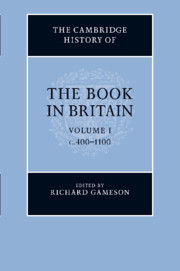Book contents
- Frontmatter
- 1 From Vindolanda to Domesday: the book in Britain from the Romans to the Normans
- PART I THE MAKING OF BOOKS
- PART II THE CIRCULATION OF BOOKS
- PART III TYPES OF BOOKS AND THEIR USES
- PART IV COLLECTIONS OF BOOKS
- 27 Patrick, apostle of the Irish
- 28 The library of Iona at the time of Adomnán
- 29 Literacy in Anglo-Saxon England
- 30 Aldhelm’s library
- 31 The library of the Venerable Bede
- 32 The library of Alcuin’s York
- 33 The library of Cynewulf
- 34 King Alfred and his circle
- 35 Ælfric’s library
- 36 The library of Byrhtferth
- 37 The library of Wulfstan of York
- 38 Rhygyfarch ap Sulien and Ieuan ap Sulien
- PART V CODA
- Bibliography
- Concordance of named manuscripts
- Index of manuscripts
- General Index
- Plate 4.1: The Lindisfarne Gospels"
- Plate 5.1: The Lichfield/St Chad Gospels"
37 - The library of Wulfstan of York
from PART IV - COLLECTIONS OF BOOKS
Published online by Cambridge University Press: 28 March 2012
- Frontmatter
- 1 From Vindolanda to Domesday: the book in Britain from the Romans to the Normans
- PART I THE MAKING OF BOOKS
- PART II THE CIRCULATION OF BOOKS
- PART III TYPES OF BOOKS AND THEIR USES
- PART IV COLLECTIONS OF BOOKS
- 27 Patrick, apostle of the Irish
- 28 The library of Iona at the time of Adomnán
- 29 Literacy in Anglo-Saxon England
- 30 Aldhelm’s library
- 31 The library of the Venerable Bede
- 32 The library of Alcuin’s York
- 33 The library of Cynewulf
- 34 King Alfred and his circle
- 35 Ælfric’s library
- 36 The library of Byrhtferth
- 37 The library of Wulfstan of York
- 38 Rhygyfarch ap Sulien and Ieuan ap Sulien
- PART V CODA
- Bibliography
- Concordance of named manuscripts
- Index of manuscripts
- General Index
- Plate 4.1: The Lindisfarne Gospels"
- Plate 5.1: The Lichfield/St Chad Gospels"
Summary
Wulfstan of York was by any measure a central figure in late Anglo-Saxon England. His political importance as one who not only managed to survive but to thrive during the reigns of both the Anglo-Saxon King Æthelred II (who ruled 978–1013 and again 1014–16) and the Danish King Cnut (who ruled 1016–35), for both of whom he wrote laws, is matched by his contemporary literary impact as a reader, writer and reviser of an impressive range of works in both Latin and Old English, and a source used freely and echoed often by others. The exact extent of Wulfstan’s corpus is still a matter of debate, although great strides have been made in the past century or so, largely through closer appreciation of his idiosyncratic style: he has been identified as the author of a range of sermons (often surviving in variant versions), of sundry law-codes, of the prose sections of the Benedictine Office, of the so-called Canons of Edgar, directed at the secular clergy, of the Institutes of Polity (again surviving in variant versions), which outlines the political and social roles of church and state, of two treatises (now called Gerefa and Rectitudines) that give advice on managing a large estate, and perhaps of two rhythmical passages found on the one hand in the D and E versions of the Anglo-Saxon Chronicle under the year 959, and on the other in the D version for 975. Various Latin texts and compilations have also been attributed to Wulfstan on topics and in manuscripts that for one reason or another can be associated with his name. The combined output thus far identified is impressive, and was evidently produced over a sustained period of literary activity that was necessarily combined with heavy political and ecclesiastical duties, albeit both precise dating of individual items and an agreed comparative chronology are still some way off.
- Type
- Chapter
- Information
- The Cambridge History of the Book in Britain , pp. 694 - 700Publisher: Cambridge University PressPrint publication year: 2011
- 1
- Cited by



